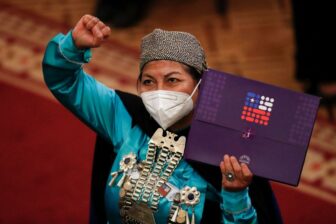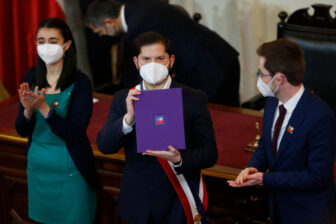With an unexpectedly large margin of 62% to 38%, Chileans voted to reject the text for a new constitution. Polls had indicated that a majority of voters were against the document, but the margin of rejection was stronger than expected. The question now is what will come next, since in 2020 an even larger majority of Chileans—78%—voted “yes” to substitute the existing constitution from the Pinochet era. The vote has already shaken the government of President Gabriel Boric, who summoned all parties to a meeting this Monday and a cabinet shake-up is being discussed.
AQ asked observers in the country their impressions on the vote, and what will be next for Chile.
Isabel Aninat, dean of the law school at Adolfo Ibáñez University
The results are evident. Almost two years ago, 78.3% voted in favor of a new constitution. Yesterday, 61.87% rejected the proposal for change. With many reflections still pending, one thing is clear: The constitutional process will continue in Chile. As the results came in, voices from across the political spectrum, including the right, came forth with their commitment to start again. Over the coming weeks, the design of the next convention must be agreed upon.
Some ideas have gained force over the last weeks: an election to be held over the first few months of 2023 (the organizing body needs at least 120 days) for a smaller and shorter convention. And, while gender parity seems to be agreed on, there will probably be electoral changes in its design, particularly regarding independents and Indigenous seats. This negotiation will concentrate a lot of attention. But a key reflection should put its focus on why the proposed text was rejected.
The results will be explained from various angles. From the constitutional side, as shown by different polls, part of the rejection emanated from the context of the proposal. The frivolous behavior of many constitutional representatives was highly disapproved of. Not only because of the scandals that some of them generated, but the whole group lost its approval shortly after the deliberation began. However, the text itself was also a cause for rejection. One that had strong accents on areas that do not have cross-cutting consensus (plurinationalism being one of them), that moved away from historic institutions (the Senate or the judiciary, for example) and that put forth proposals with more emphasis on issues and groups than on institutional designs for a functioning democracy.
A new constitutional process will have to tackle the same constitutional questions: the political system, social rights, local governments, courts, climate change and so forth. Reflecting on which proposals must be left behind will be the key constitutional exercise for the coming months. The opportunity is set for a return to the idea of a minimalistic text, one that would allow to build the much-needed widespread majorities.
Robert Funk, deputy director of the University of Chile’s Institute for Public Affairs
While it is too soon to adequately explain why Chile’s constitutional proposal was rejected by 62% of voters, some problems were evident from the beginning. Even before the convention met, one of its members, who campaigned on the issue of health care, had to resign when it emerged he had lied about his cancer diagnoses. Then, when the constitutional convention was inaugurated, jeers were heard from some convention members who objected to singing the national anthem. These events set the tone: an emphasis on identity, Indigenous rights, and a questioning of the most basic republican traditions—an attitude that reflected the views of many of Chile’s university-educated middle-class youth, but not necessarily of the electorate at large.
This view not only impacted on the behavior of convention members, but on the text as well. While the October 2019 protesters were hoping for an expansion of rights and an improvement in social services, the constitutional proposal went much further, changing the judicial system, installing semi-federal regional governments, and eliminating the Senate in a severe weakening of checks and balances. Perhaps most controversially, in its laudable efforts to recognize Indigenous rights, the new constitution gave the country’s first nations a veto on a slate of vaguely defined issues. Many Chileans viewed this as preferential treatment for a minority.
In a televised speech President Boric said that “as president, I humbly accept this message and make it my own. We must listen to the voice of the people” …. “maximalism, violence and intolerance must be set aside.” He hinted at a cabinet shuffle, perhaps as early as this week. The Reject vote may weaken the president’s political capital, but it is also an opportunity. If he manages to reach out to coalition and opposition moderates, he may cobble together a path forward, enabling him to move ahead on his legislative agenda and the new constitutional process. The question is whether he loses the support of the Communist Party and other hard left groups.
María Jaraquemada, executive director of Chile Transparente
The results of the exit referendum were surprising for almost all. Polls were indicating a 10-point advantage for the Rechazo option, and none suggested that rejection to the proposed new constitution would be that large. Clearly Chileans, didn’t feel represented by the text proposed by a Constitutional Convention formed by a majority of social leaders and advocates, and a minority of politicians.
President Boric’s government supported the approval position and is now seriously wounded with these results. We will have to see how this process will continue. Almost all the political parties that supported the Rechazo vote say they’ll agree to a new Constitutional Convention, but most probably with different electoral rules regarding who will be able to participate. Now, as in November 2019, Congress will be the place to negotiate what will follow in the next months. The good news is that, once again, an institutional agreement will pave the road for a new Constitution in Chile. But it is also important to note that the process itself was impeccable. Almost 13 million people voted in this referendum that brought back compulsory voting for the first time in 10 years. That was reflected in the participation: Turnout at the 2020 referendum—which approved the creation of the constitutional assembly in the first place—was just 51% of voters, while 86% voted this Sunday.
Loreto Cox, assistant professor at the School of Government at Universidad Católica de Chile
Chilean politics have been turbulent in the last decade. Every election has implied a turnaround, and despite this constant searching, citizens are increasingly dissatisfied with the political elites. The levels of trust in all institutions fell dramatically, especially trust in political institutions.
The ineffectiveness of the political system has prevented solving long-held demands for more assurance. We have discussed pensions for the last three governments, without finding a way out. There are around 20 political parties in Congress, but less than a fifth of the population identifies with any of them. This archipelago of parties hinders reaching agreements because there are simply too many; and it hinders sustaining them because it is tempting to defect when party decisions are not backed by relevant votes. This scenario has resulted in increasingly personalist politics and bad policies (like consuming an important part of pension savings).
Amid the crisis, paving the way for new elites appeared as a form to improve representation, and the Convention’s electoral rules allowed lists of independent candidates to take advantage of the proportional system. The results were even worse. The new elites proved to be as poor in virtue as the traditional ones, but with less understanding of the need for political compromise. The voters who supported these lists will not know for sure who to punish with their vote in the future.
Chile needs to bolster political parties. Any route of change must include new, party-reinforcing electoral rules, including those for the new Convention that will likely come. Giving political parties more power will be read as further abuse. It is, perhaps, alike to the case of a fiscal adjustment: it is necessary, but it hurts, and nobody wants to be its visible face. Thus, bringing parties back in requires political support. Postponing the adjustment will only deepen the crisis.
Rossana Castiglioni, dean of social sciences and history at Universidad Diego Portales
Chileans went to the polls to vote whether they wanted to accept or reject the new Constitution that a Convention, comprised of members elected by citizens, wrote. Chile´s plebiscitary outcome is not entirely surprising, considering that most public opinion polls of the past few weeks anticipated the rejection of the new Constitution. However, the result itself is undoubtedly shocking, not only when considering the high number of votes that the rejection of the new Constitution received, but also when we place the electoral outcome in the larger political context.
What should probably come in the near future is a process of introducing constitutional changes committed to capturing citizens’ hearts and minds. Doing so will not be easy and will require that political parties and leaders be willing to compromise, make sacrifices and tough decisions on complex issues. Congress will have a crucial role in tackling the political challenges that this electoral outcome brings and the government of President Gabriel Boric will have to work on promoting cohesion within a highly fractionalized left. A key problem is that no political force holds a majority in Congress. Political parties and actors will have to be willing—and able—to build a broad coalition, instill discipline within Congress, and behave with a significant level of responsibility and generosity.
Patricio Navia, professor of liberal studies at NYU and professor of political science at Universidad Diego Portales
The decisive victory for the Reject vote should not be seen as a failed democratic experience. Chileans want a new constitution, but they want a constitution that will not throw the baby out with the bathwater.
Starting this week, Boric and the leadership of the legislature will attempt to work out a mutually acceptable mechanism that can also have popular support. Chileans have already spent the past 3 years in constitution writing mode. People want a new constitution, but they don’t want to wait forever to get it. And they prefer a solution that combines a short period of time and assurances that the text will build on the strengths and correct some of the shortcomings of the current text. Chileans do not want a new economic model, but they want the economic model to work for them.
The uncertainty associated to a constitution writing process will not disappear from Chile until a new text is agreed upon. That can take up to a year—longer if there is a new election for a constitutional convention. So, Chile is not out of the woods yet in terms of constitution writing. However, compared to the certainty of the cumbersome property rights, environmental protection and Indigenous rights over historical lands provisions that would have resulted from the approval of the proposed text, the uncertainty associated to initiating a new constitution writing process is far preferable.







